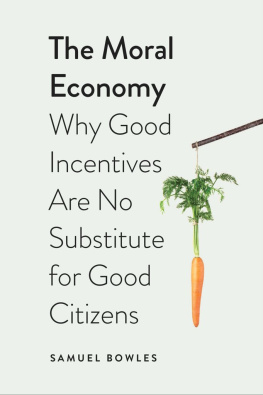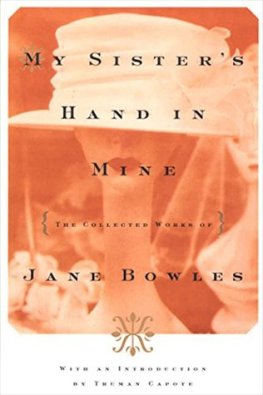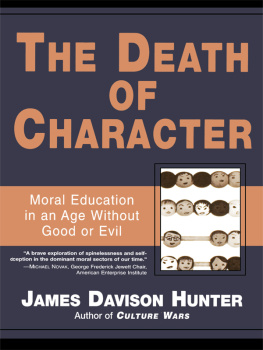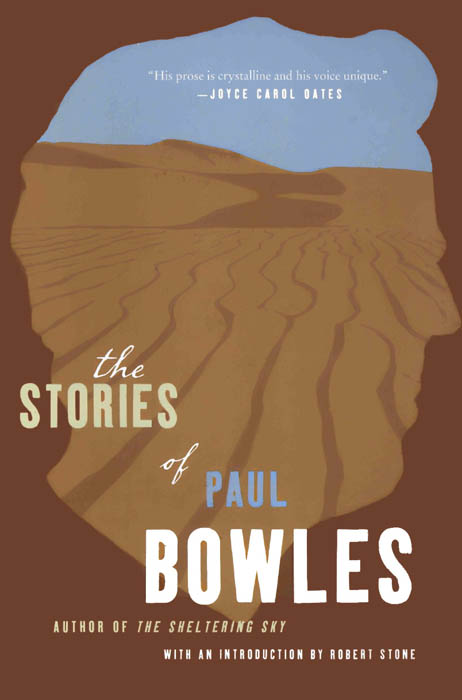Samuel Bowles - The Moral Economy: Why Good Incentives Are No Substitute for Good Citizens
Here you can read online Samuel Bowles - The Moral Economy: Why Good Incentives Are No Substitute for Good Citizens full text of the book (entire story) in english for free. Download pdf and epub, get meaning, cover and reviews about this ebook. year: 2016, publisher: Yale University Press, genre: Politics. Description of the work, (preface) as well as reviews are available. Best literature library LitArk.com created for fans of good reading and offers a wide selection of genres:
Romance novel
Science fiction
Adventure
Detective
Science
History
Home and family
Prose
Art
Politics
Computer
Non-fiction
Religion
Business
Children
Humor
Choose a favorite category and find really read worthwhile books. Enjoy immersion in the world of imagination, feel the emotions of the characters or learn something new for yourself, make an fascinating discovery.
- Book:The Moral Economy: Why Good Incentives Are No Substitute for Good Citizens
- Author:
- Publisher:Yale University Press
- Genre:
- Year:2016
- Rating:3 / 5
- Favourites:Add to favourites
- Your mark:
- 60
- 1
- 2
- 3
- 4
- 5
The Moral Economy: Why Good Incentives Are No Substitute for Good Citizens: summary, description and annotation
We offer to read an annotation, description, summary or preface (depends on what the author of the book "The Moral Economy: Why Good Incentives Are No Substitute for Good Citizens" wrote himself). If you haven't found the necessary information about the book — write in the comments, we will try to find it.
Samuel Bowles: author's other books
Who wrote The Moral Economy: Why Good Incentives Are No Substitute for Good Citizens? Find out the surname, the name of the author of the book and a list of all author's works by series.
The Moral Economy: Why Good Incentives Are No Substitute for Good Citizens — read online for free the complete book (whole text) full work
Below is the text of the book, divided by pages. System saving the place of the last page read, allows you to conveniently read the book "The Moral Economy: Why Good Incentives Are No Substitute for Good Citizens" online for free, without having to search again every time where you left off. Put a bookmark, and you can go to the page where you finished reading at any time.
Font size:
Interval:
Bookmark:
The Castle Lectures in Ethics, Politics, and Economics
THE MORAL ECONOMY
WHY GOOD INCENTIVES ARE NO SUBSTITUTE FOR GOOD CITIZENS
SAMUEL BOWLES
Yale UNIVERSITY PRESS
New Haven and London
Copyright 2016 by Samuel Bowles.
All rights reserved.
This book may not be reproduced, in whole or in part, including illustrations, in any form (beyond that copying permitted by Sections 107 and 108 of the U.S. Copyright Law and except by reviewers for the public press), without written permission from the publishers.
Yale University Press books may be purchased in quantity for educational, business, or promotional use. For information, please e-mail (U.K. office).
Set in Gotham and Adobe Garamond type by Newgen North America.
Printed in the United States of America.
ISBN 978-0-300-16380-3 (hardback : alk. paper)
Library of Congress Control Number: 2015956890
A catalogue record for this book is available from the British Library.
This paper meets the requirements of ANSI/NISO Z39.48-1992 (Permanence of Paper).
10 9 8 7 6 5 4 3 2 1
Parts of this book were given as the Castle Lectures in Yales Program in Ethics, Politics, and Economics, delivered by Samuel Bowles at Yale University in 2010.
The Castle Lectures were endowed by Mr. John K. Castle. They honor his ancestor the Reverend James Pierpont, one of Yales original founders. Given by established public figures, Castle Lectures are intended to promote reflection on the moral foundations of society and government and to enhance understanding of ethical issues facing individuals in our complex modern society.
To my teachers
Alexander Gerschenkron
&
Charles E. Lindblom
Political writers have established it as a maxim, that in contriving any system of government... every man ought to be supposed to be a knave and to have no other end, in all his actions, than his private interest. By this interest we must govern him, and, by means of it, make him, notwithstanding his insatiable avarice and ambition, cooperate to public good.
... It is, therefore, a just political maxim, that every man must be supposed a knave: Though at the same time, it appears somewhat strange, that a maxim should be true in politics, which is false in fact.
David Hume, Essays: Moral, Political, and Literary (1742)
Contents
Preface
Any book in the making for almost thirty years is indebted to many helping hands. This one is based in part on my Castle Lectures at Yale University, where the critical commentary of Bryan Garsten, Phil Gorski, Laurie Santos, Steven Smith, and Chris Udry resulted in many improvements.
This is the second time that I have learned from Yales social science faculty. The first was as a student in the precursor to the Ethics, Politics and Economics major, which sponsored my Castle lectures. My first debt, then, is to my mentor and inspiration in that program, Charles Lindblom, who pushed me to think analytically while trespassing the well-guarded boundaries of the academic disciplines. (The tradition that Lindblom championed at Yale is still evident in the disciplines of those who commented on my Castle Lectures: a historian, a psychologist, two political scientists, and an economist.) My subsequent study of economic history as a doctoral student with Alexander Gerschenkron at Harvard convinced me that the large questions about how societies might be better governed and how they evolve over time are worth asking and sometimes might have answers, though not necessarily the answers I was hoping for at the time.
During my work on this project since the late 1980s, my thinking on these issues has been shaped by the members of the September Seminar past and presentPranab Bardhan, Robert Brenner, Harry Brighouse, the late Gerald Cohen, Joshua Cohen, Jon Elster, Suresh Naidu, Philippe van Parijs, Adam Prezeworski, John Roemer, Rebecca Saxe, Seana Shiffrin, Hillel Steiner, Robert van der Veen, and Erik Olin Wright, and by the Santa Fe Institute Working Group on the Coevolution of Behavior and Institutions (since 1998)Larry Blume, Robert Boyd, Herbert Gintis, and Peyton Young. Gintis doctoral dissertation on how society shapes our preferences and my collaboration with him since has profoundly influenced my thinking on these issues.
Many of the ideas in the pages that follow were first tried out during the late 1990s in the Norms and Preferences Research Network headed by Robert Boyd and Gintis, whose members I thank, especially Colin Camerer, Martin Daly, Ernst Fehr, Simon Gaechter, Edward Glaeser, George Loewenstein, and the late Margo Wilson. For their comments on earlier drafts of this work and other contributions to the research, I would particularly like to thank (in addition to those already mentioned) Mahzarin Banaji, Yochai Benkler, Ragnhild Haugli Braaten, Juan Camilo Cardenas, Wendy Carlin, Ruth Grant, Joshua Greene, Jonathan Haidt, Kieran Healy, Bernd Irlenbusch, Rachel Kranton, Ugo Pagano, Elizabeth Phelps, Sandra Polana-Reyes, Carlos Sickert Rodriguez, Daria Roithmayr, Paul Seabright, and, especially, Elisabeth Jean Wood.
My collaborators Sung-Ha Hwang and Sandra Polana-Reyes are virtual coauthors of parts of the book; I am grateful to them for permission to use the results of our joint work. include material published jointly with Polana-Reyes in the Journal of Economic Literature (2012).)
Susan Karr, Chiara Valentini, and, especially, Erica Benner helped me understand Niccol Machiavelli, a figure who plays a leading and complicated role in the story I tell. Translations from the Italian of passages in Machiavellis Discourses and The Prince are my own.
The Santa Fe Institute and the Certosa di Pontignano of the University of Siena have provided unsurpassed environments for research, reflection, and writing. Their staffs have made this research both enjoyable and possible, with particular thanks to Margaret Alexander, Joy Lecuyer, Barbara Kimbell, and Susan Macdonald of the Santa Fe Institute Library. I would also like to thank Nicole Villar Hernandez for assistance with the research, Davide Melcangi and Sai Madhurika Mamunuru, repectively, for creating the figures and the index, and the MacArthur Foundation, the Behavioral Sciences Program of the Santa Fe Institute, and the U.S. National Science Foundation for financial support. Finally, I am indebted to the late George Cowan and Adele Simmons for their abiding confidence in my research trajectory and for their support over the years.
In case you are wondering how such a little book could take so long to write, the short of it is that I had a lot to learn. Here is the story in brief. When I started working on the cultural effects of markets and incentives in the late 1980s, I found myself writing abstract models, which did not allow me to say anything about what had attracted me to the subject: the empirical challenges of designing better policies, institutions, and constitutions. I fell to doing models by default: available data were inadequate to test my hypotheses about peoples ethical, intrinsic, and other noneconomic motivations and how they might be affected by the incentives, legal constraints, and the other instruments of public policy. There was even serious doubtand not only among economists and biologistswhether such motives were common enough to warrant serious study.
in this book were beginning to take shape.
Around the turn of the millennium, I took up what seemed to me the obvious next question: if, as the experiments appeared to show, people are more generous and civic minded than either economists or evolutionary biologists assumed, this posed a puzzle. Neither natural selection nor any of the then-prominent models of cultural evolution provided a ready answer to how this could have come about.
Next pageFont size:
Interval:
Bookmark:
Similar books «The Moral Economy: Why Good Incentives Are No Substitute for Good Citizens»
Look at similar books to The Moral Economy: Why Good Incentives Are No Substitute for Good Citizens. We have selected literature similar in name and meaning in the hope of providing readers with more options to find new, interesting, not yet read works.
Discussion, reviews of the book The Moral Economy: Why Good Incentives Are No Substitute for Good Citizens and just readers' own opinions. Leave your comments, write what you think about the work, its meaning or the main characters. Specify what exactly you liked and what you didn't like, and why you think so.










